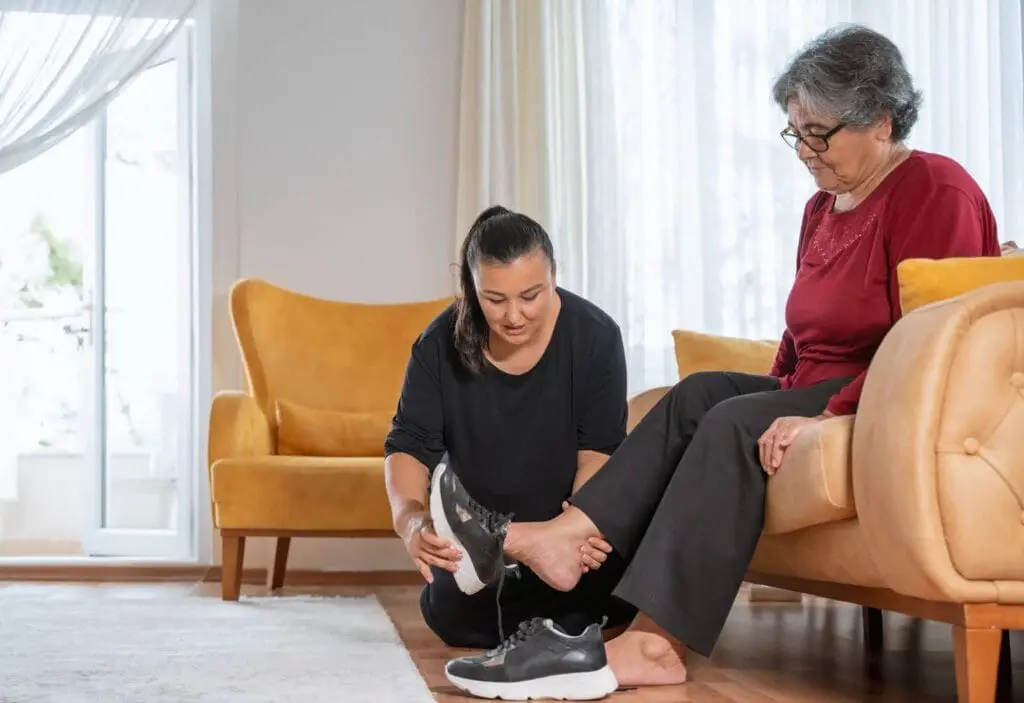It’s natural to worry about aging parents’ well-being. When concerns about their health and wellness arise, assisted living can provide a wonderful solution, offering a supportive environment where they can thrive.
This guide will show you how to talk to parents about assisted living and help you have open, loving conversations about their best interests.
In this guide, we’ll discuss common signs that assisted living might be a good fit, how to understand your loved ones’ perspectives on the idea, and provide tips for navigating the conversation with compassion and respect.
Common Signs It Might Be Time for Assisted Living
Seniors age at different paces, but there are signs that may indicate when it might be time to consider the added support and enhanced lifestyle that only an assisted living community can provide.
Here are common signs to consider:
Difficulty With Activities of Daily Living (ADLs)
These include bathing, dressing, eating, using the restroom, and moving around. If these tasks become increasingly challenging, it may indicate a need for assistance.
Assisted living communities, like The Commons at Central Baptist Village, provide just the right amount of personalized care, ensuring they can enjoy retirement as independently as possible.
Frequent Falls
Falls are a major risk factor for seniors. Assisted living provides a safer environment with handrails, walk-in showers, and potential emergency alert systems.
The floor plans at Central Baptist Village are not only easy to navigate and equipped with extra safety features, but they’re also well-appointed and freshly renovated.
Unmanaged Health Conditions
Difficulty managing medications, chronic conditions like diabetes or heart disease, or increasing memory issues all benefit from the support available in assisted living.
Assisted living communities provide 24/7 for a wide range of health issues. For example, Central Baptist Village offers progressive assistance and additional graduated services, including medication administration, as your loved ones’ needs change.
Unkempt Appearance and a Messy Home
Noticeable weight loss, poor hygiene, or inappropriate clothing choices might signal a lack of ability to manage self-care. Expired food, piles of dirty laundry, clutter, or missed maintenance are signs someone may be overwhelmed with managing a home.
Along with personalized assistance with ADLs, The Commons features maintenance-free residences, weekly housekeeping services, daily bed-making, and personal laundry services so your loved one can focus on enjoying retirement, not an endless to-do list.
Missed Bills or Financial Confusion
Late payments, susceptibility to scams, or difficulty handling finances may indicate a need for support.
One of the biggest benefits of assisted living is that a majority of your mom and dad’s bills are included in one monthly payment, streamlining their finances. At Central Baptist Village, the monthly rental fee covers all utilities, phone, cable, WiFi, and more.
Social Isolation and Loss of Interest in Hobbies
Loneliness and lack of social interaction are significant risk factors for health issues and cognitive decline. Loss of interest in hobbies, lack of motivation, and changes in mood due to your parents’ environment can lead to depression and anxiety.
Many assisted living communities are focused on providing the perfect balance of care, enrichment, and social connection. The residents in our community enjoy a variety of activities, events, and amenities carefully curated to their unique needs and preferences—just steps away from their front doors.

Caregiver Burnout
Caregiver burnout and guilt are very valid and important reasons to bring up the possibility of assisted living with your parents. Here’s why:
Your Well-Being Matters
Trying to provide ongoing care while balancing your own life is incredibly difficult and often leads to stress, exhaustion, and even health concerns. Assisted living helps ensure your mom and dad get the help they need while giving you a much-needed break.
Impact on Your Relationship
Caregiver burnout can strain even the strongest parent-child relationships. Frustration and resentment can creep in when you’re always the one providing help. Assisted living can shift the dynamic so you can focus on being their loving child again.
Quality of Care
When you’re burnt out, the level of care you can provide may suffer. Professionals in assisted living are trained to handle everyday tasks and health needs with patience and expertise. Your parents will get consistent care, and you’ll have peace of mind.
Understanding Your Loved Ones’ Perspectives
Talking about assisted living can be emotionally charged. It’s crucial to approach these conversations with deep understanding and sensitivity. Here are some common concerns seniors might have:
Fear of Losing Independence
Often, the biggest concern for seniors is the idea of giving up control over their lives and routines. They may view assisted living as relinquishing the home where they’ve built memories and their personal space.
Emphasize that assisted living is about gaining support to maintain independence for longer, with the added benefit of safety and security measures.
Pride
Admitting a need for help, even with daily tasks that may be getting harder, can be a blow to seniors’ self-images. They may not even be fully aware of potential risks or how much they are struggling.
Focus on how assisted living relieves burdens, lessens stress, and offers support in areas where it’s needed rather than implying a loss of ability.
Fear of the Unknown
Moving to a new environment and the social aspects of joining a community can be daunting. Fears about not fitting in, not liking the change, or feeling isolated are common.
Acknowledge these fears and discuss the social benefits of community life, offering opportunities to make friends, participate in activities, and reduce isolation.
Outdated Associations
Older generations sometimes have negative stereotypes attached to the idea of “nursing homes.” They may not realize the vibrancy and variety that modern senior living communities offer.
Highlight the range of modern senior living options—vibrant communities focused on activities, social connections, and wellness—that are far from negative stereotypes.
Financial Concern
Worries about costs, affording care, and potential burden on family members are real concerns for many seniors.
Help them understand the different resources available. Stress that many communities work with families to find affordable living solutions, making costs less daunting.
Central Baptist Village is a nonprofit senior living community. Unlike other places with large buy-in fees, we offer all the benefits of our community without a hefty price tag. We also reinvest our returns to improve our community, train our staff, and provide more options for our residents to age well.
Tips on How To Talk to Your Parents About Assisted Living
Navigating these conversations can be complex. Here are tips to make it a little easier:
- Reflect on your reasons: List the specific concerns you have about your loved ones’ safety, health, or overall well-being. This will help you stay focused during the discussion.
- Shift your mindset: Think of assisted living as a proactive step to enhance life, providing new opportunities for social connection, reduced daily stress, and safety.
- Do your research: Find a few communities that align with your loved ones’ needs and preferences. Be prepared to address costs and care levels.
- Choose the right moment: Seleca calm time when everyone can focus. Avoid bringing it up after an incident or during a stressful period.
- Lead with love and concern: Start with something like, “Mom, your well-being means the world to me, and I’ve been thinking about ways to make sure you’re safe and happy.”
- Emphasize the positives: Highlight companionship, activities, delicious meals, help with ADLs, and the peace of mind it brings everyone.
- Frame it as a collaboration: “Let’s explore options together. What do you think about communities that offer…?” Involve them as much as possible.
- Remind them this is about living their best life: “You’re still you; we just want you to thrive. Imagine having more time for the things you love!”
- Expect some resistance: Change is hard. Don’t get discouraged if the first conversation isn’t perfect. Leave the door open for future discussions.
- Offer a casual tour: “There’s a community nearby having an open house. Want to check it out with me? No pressure, just to see what it’s like.”
- Enlist support: Have siblings or other trusted family members on the same page so your loved ones feel supported.
Be patient and persistent: These conversations take time. Keep the lines of communication open and demonstrate respect throughout the process.

Discover Helping Hands and Hearts to Serve at Central Baptist Village
We understand these decisions aren’t easy. You want the best for your loved ones, and we’re here to help you discover the possibilities.
Contact us online or call us at 708-515-4856 and let’s discuss your unique situation. We’ll work together to find solutions that give you peace of mind and help your loved ones embrace a full and vibrant life.

